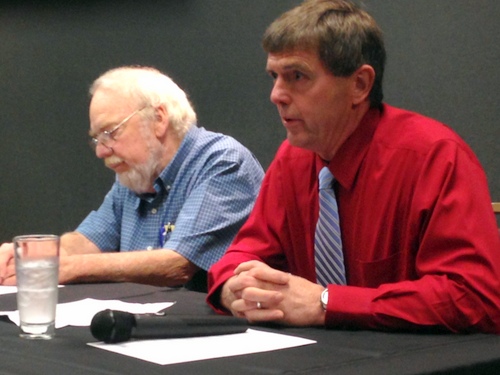
Candidates Tom Conley (l.) and Tim Fulton are familiar company. They served three years together previously on the school board. Funding pressures have kept the board focused — and united — in recent years. (KCAW photo/Robert Woolsey)
Beginning next month, Sitka will have a school board solidly aligned in its opposition to vouchers, its opposition to amending the state constitution to allow public funding for private and parochial schools, and in its support of teachers.
Candidates Tom Conley and Tim Fulton answered questions during a candidate forum at the Sitka Chamber of Commerce this week.
Well, it wasn’t exactly a debate. Tom Conley has 13 years under his belt on Sitka’s School Board. He’s re-upping after a two-and-a-half year break. Tim Fulton is a six-year incumbent.
There wasn’t much disagreement between the two during the years that they served on the board together. And there wasn’t any during the Chamber forum.
I totally agree with Tom on this…
Completely in agreement with what Tim was saying…
I agree with what Tom’s saying for sure…
Rather than cover the same ground as Tim, which I completely agree with…
You get the picture. But, in all fairness, Sitka’s board has not been polarized much in the last few years, as the district has been forced to manage declining enrollments, relatively flat funding from the state, increased travel costs for student activities, and now, an active effort in the legislature to fund private and parochial schools.
These pressures have created solidarity on the board that was reflected in the chamber forum. That, and the fact that these are the only two candidates running for the two open seats. Nevertheless, Conley and Fulton both brought strong opinions to the conversation.
Conley, a pediatrician, could not overemphasized the importance of early childhood education.
“We know that if you’re not reading by third grade, you’re probably going to fail school. Eventually.”
During Conley’s absence, the board cut a reading specialist at Baranof Elementary School, as well as the middle-school Home Ec program. Fulton said it was not an easy decision.
“Last year we had to cut programs, the first time since I’ve been on the board. We’ve lost programs — probably yearly — through retirement and other things, but last year we had to make cuts.”
Other financial pressure on the district mentioned by the candidates: An increase of only $150 dollars in per-pupil funding from the state this year — a formula often referred to as the BSA, or base student allocation. And the City of Sitka’s break from long-standing tradition, and funding schools roughly $1.3-million below the maximum allowed by law — a phenomenon called funding “below the cap.”
But not all financial pressure is external. The district has been criticized for overspending on technology. Both Conley and Fulton stressed that technology was a means to an end.
“The most important element in a successful education is hiring and maintaining an excellent teaching staff.”
“The technology might become obsolete, but what we’re teaching our kids is not. If we can teach them the love of learning, the passion for knowledge, and the correct way to disseminate that through the internet and everything out there, social medias and so on — that’s what we need to do.”
The candidates also held strong views on what they perceive as threats to public education in the legislature. Sen. Mike Dunleavy is a former school teacher, principal, and superintendent in Wasilla, who also spent two years on that community’s school board. He’s introduced Senate Joint Resolution 9 which would amend the constitution to allow public funding of private education.
Conley called it “inconsistent with the American philosophy of government.”
“It is unfair to children who are left in public schools after the others leave. Parochial and private schools that brought on vouchers, generally speaking, take only the cream of the crop. They don’t take children who are disabled in any way.”
Other ideas being floated in the legislature include changing or eliminating teacher tenure — or a guarantee of staying in a job.
Fulton says it’s on the public’s mind. He thinks the answer is a combination of teacher evaluations and tenure.
“The bottom line is we need effective teachers. We need teachers to be the best. If we have a teacher who is not producing, we’ve lost that classroom, we’ve lost those students.”
Fulton also defended the district’s adoption of the Common Core, which in this state are known as the Alaska Standards. Common Core has become politicized. Fulton thinks the controversy is a distraction.
“The Common Core standards are good. It increases the rigor for students, increases our expectations. It helps them compete on a national level, and to be competitive in this world economy that we find ourselves in.”
In the past, Fulton has made activities funding a top issue, as increased participation costs have created iniquities for some students and families. Conley did not want to strip school down to just academics, and cited one avenue for savings.
“We should probably be wondering and considering and discussing just how much money we should be spending on travel.”
In closing, Conley told the chamber audience that children had been his life’s work. A pediatrician for 45 years, Conley retired in 2013 from SEARHC. Fulton has worked for Alaska Airlines for 38 years — since graduating from high school. He told the chamber, “I play well with others. I think I’ve been doing a good job.”






























